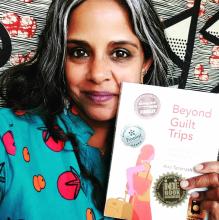Q: Hello Dr. Anu! Please tell us about your book Beyond Guilt Trips.
A: Beyond Guilt Trips: Mindful Travel in an Unequal World uses storytelling and
reflection to invite readers to consider their travel from the lens of identity, race,
difference and social justice. These are, of course, big and sometimes intimidating
topics, and can inspire equally big and intimidating feelings in us. My book helps
readers understand and navigate these feelings in a friendly and compassionate manner.
I tell many stories about travelling in places that are culturally, racially and
economically different from what we know, and pose questions for thoughtful
discussion. Unpacking the big feelings lightens us, and can make travel a more
connective and mindful experience.
Q: In the introduction you say you wrote the book because you wanted to read it, but it
didn’t exist. That’s very CHID-like, to be the agent of your education. Tell us more.
A: Yes, this is the book I wanted to read but had never found. I wanted a book to discuss
global history, colonialism and why some regions of the world were more resourced and
wealthy than others, and to do so alongside a discussion about wealth and racial equity
in the US. My family story too is part of the local and global story. We are immigrants
who have journeyed from a less-resourced country to a wealthier one. We are also
people of color who are not Black. Both of these facts have shaped my experiences of
what home means, being American, being different, experiencing racism, and feeling
like I belonged or not. On the professional level, my work as a racial equity and diversity
consultant in the US, along with my work in global travel and international education,
have brought these different conversations into one frame as well. Beyond Guilt Trips is
undoubtedly the book that only I could have written, and incorporates many of these
experiences.
Q: You’ve been described as “pushing the conversation without pushing folks away.”
Can you say more about this?
A: Yes, this stance of mine is very deliberate. My work is to invite people to talk about
sensitive issues like identity, society, history, harm, heart and healing. These
conversations often make us feel a wide variety of complex emotions such as shame,
guilt, disconnection, anxiety, shut down, fear of being wrong or misunderstood. What if
instead we could approach sensitive issues with actual sensitivity, compassion and
mindfulness about who we are and the feelings we might be bringing into the room? I’ve
found this approach helps many people feel more open and willing to participate.
Q: Beyond Guilt Trips argues for honest conversation about harm, and also makes
space for joy. Why is joy important for people invested in social justice and equity?
A: I am passionately committed to joy, partly because joy is so wonderfully joyful, and
also because joy IS a critical component of justice work. We certainly need material
changes in our society to offer more safety, choice, dignity and opportunity for all. Our
communities could also thrive if more of us felt peace, rest, ease, laughter and play,
wouldn’t you agree? Joy reminds us that we are not only warriors fighting to rectify
society’s broken promises. Joy reminds us that we can feel delight too, which in our
unequal and difficult world, is nothing less than radical to the core!
